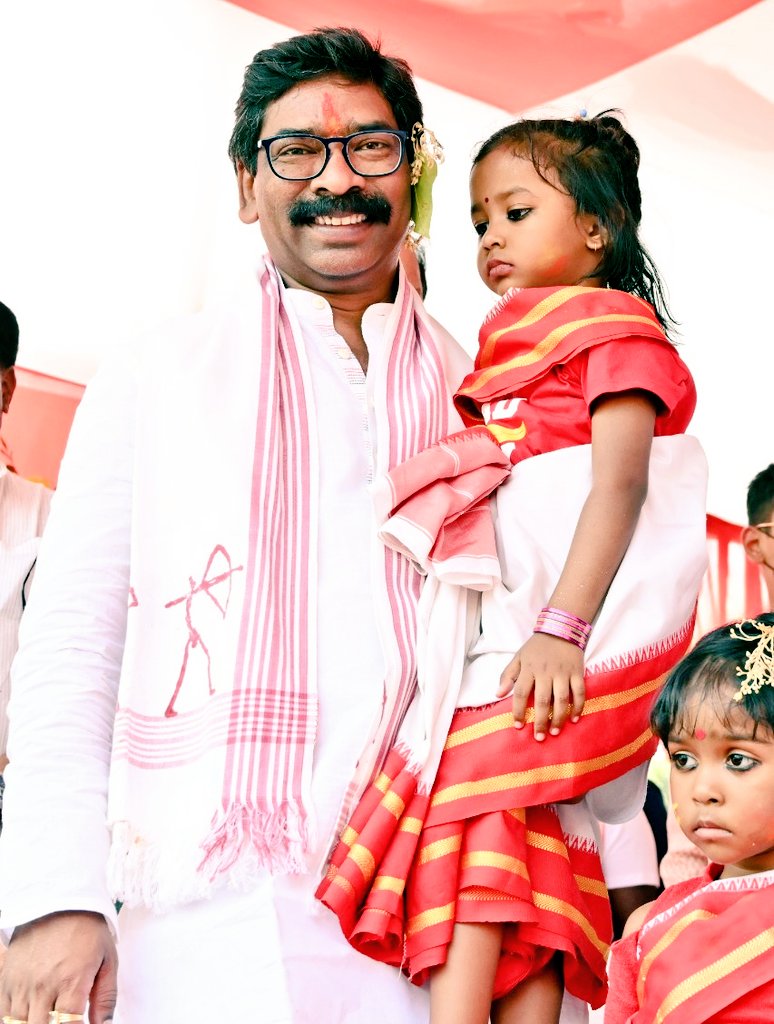CM Soren’s welfare schemes are drawing huge response from every quarter in Jharkhand
In the last 4 years, the state of Jharkhand has made significant strides in the fields of education, employment, health and welfare, sports, tourism, renewable energy and industries to enhance the quality of life. Significant achievements in the area of law and order, like eradication of left-wing terrorism and creating developmental opportunities in the Budha Pahad region ensuring peace in the state is a noteworthy move. Initiatives by the state government to provide clean drinking water, sanitation facilities, electricity access, road connectivity and housing have transformed the state.
Nearly 80 percent of the population of Jharkhand lives in villages. Before the formation of the government, CM Hemant Soren had said that the government would be run from the villages and panchayats and not from Delhi. To receive benefits people will not have to visit block offices and district headquarters, instead the government is coming to the doorstep to solve problems.
2023 marks the third phase of the programme in which camps are being organised and people’s problems are being addressed and they are getting the benefits of various schemes. A similar programme was organised in 2021 and 2022. The CM is visiting every district under this programme.
A considerable effort has been done for the education at all levels. At a cost of Rs 1885 crores, the state has laid the foundation stones for 27 Schools of Excellence. There is a plan to start 5000 Schools of Excellence in the entire state. This initiative aims to offer world-class education facilities to students in Jharkhand. On a better education system for the State Guruji Student Credit Card Scheme has been started for higher education. The government will provide financial support to students under this scheme. The state government is providing 100% scholarship to Dalit, tribal, backward and minority children for higher education abroad as well.
Under the Marang Gomke Jaipal Singh Munda Overseas Scholarship Scheme, deserving students are allowed to pursue higher studies abroad. Presently twenty-three students from Jharkhand are pursuing higher education abroad in the United Kingdom. This initiative aims to empower the youth of Jharkhand and enhance their global competitiveness. In another initiative, the government’s scholarships for children of unorganized sector workers, ranging from INR 250 to INR 8,000 have been launched. This is an important step towards ensuring that economic constraints do not impede access to education. Moreover, the ITI Colleges in Militancy Affected Districts promotes technical education and vocational training, enhancing employability among the youth.

Despite challenges, Jharkhand has achieved considerable success in improving the basic civic infrastructure and living standards. The state has made significant strides in the fields of education and employment, initiating a series of measures designed to enhance access to quality education and create employment opportunities.
In the area of employment, the Chief Minister Employment Generation Scheme promotes entrepreneurship and generates employment. It provides a provision of subsidized loans up to INR 25 lakhs for starting businesses. Also, in a bid to push transparency, JPSC Manual and Officer Appointments has been prepared and 326 officers who have been appointed under the 6th JPSC. This enhances the transparency and effectiveness of the public service recruitment process, and these appointments are a key step towards strengthening administrative capacity in the state.
Jharkhand has taken significant steps towards improving the state of nutrition and health among its residents. The initiatives span various areas, from disease prevention and management to addressing the problem of malnutrition.
The establishment of COVID-19 vaccination facilities at all district hospitals and community health centres reflects the state’s commitment to combating the pandemic. This widespread vaccination drive ensures easier access for citizens across the state to get vaccinated and contributes to public health safety.
The approval for the establishment of dialysis centres on a public-private partnership (PPP) model in all district hospitals is a major step towards enhancing healthcare infrastructure. This move expands access to essential medical treatment for kidney disease patients.
In an effort to tackle the problem of malnutrition, the state has initiated the construction of 5 lakh sheds at a cost of INR 250 crores. While the exact context and utilization of these sheds are not specified, it could be assumed that these may be used for activities related to the delivery of nutritional services, community awareness programs, and other initiatives to address malnutrition.
Scan the QR Code to watch the video:


These initiatives represent a comprehensive approach to improving the health and nutritional status of Jharkhand’s population. The focus on infrastructure development and service delivery suggests a commitment to creating a robust health system capable of addressing the state’s health challenges.
Jharkhand has taken several strides in the field of agriculture, aimed at improving the livelihood of farmers, promoting sustainable agricultural practices, and ensuring food security. Krishi Rinn Maafi Yojana (Crop Loan Waiver Scheme) has sanctioned INR 2,000 crores. Under this scheme, farm loans up to INR 50,000 have been waived off, providing significant relief to small and marginal farmers and boosting their financial stability.
The Chief Minister Pashudhan Yojana (Livestock Development Scheme) has benefited over 50,000 villagers. Livestock development plays a crucial role in supplementing the income of rural households and improving their nutritional security. Moreover, the Bonus Payment on MSP has incentivized agricultural production and ensures farmers get a fair price for their produce.
These achievements reflect the government’s commitment to promoting agricultural growth, enhancing farmers’ income, and ensuring food security in Jharkhand. It also shows the efforts towards promoting diversification and value addition in agriculture, which are crucial for the sustainable development of the sector.
The government of Jharkhand has taken considerable steps towards rural development with a special focus on women’s empowerment. These measures are aimed at enhancing income, improving livelihoods, and promoting sustainability.
For the first time, the wage rate under the Mahatma Gandhi National Rural Employment Guarantee Act (MNREGA) has been increased from INR 194 to INR 225. This wage hike is a significant move towards improving the income and economic status of rural households, including women who form a substantial part of the MNREGA workforce.
The state has set a target for maximum man-day generation under MNREGA, creating 10 crore man-days. This ensures enhanced availability of employment opportunities in rural areas, directly benefiting women who are major participants in the scheme.
Steps have been taken towards water prosperity, with trench and dam closure work completed on 2 lakh hectare land. This contributes to improved water conservation and agricultural productivity, directly and indirectly benefiting rural women.
Under this scheme, fruit trees have been planted in 26 thousand acres. This initiative promotes environmental sustainability and also provides an additional source of income for rural households, thereby empowering women.
Sakhi Mandals, or women’s self-help groups, have been allocated INR 995 crores. These funds help in strengthening the capacity of these groups and empower rural women economically and socially.
The efforts and intent of the government is being reciprocated by the masses and a stable government with a youthful and constructive leadership is bound to take Jharkhand to newer heights in the coming years.

